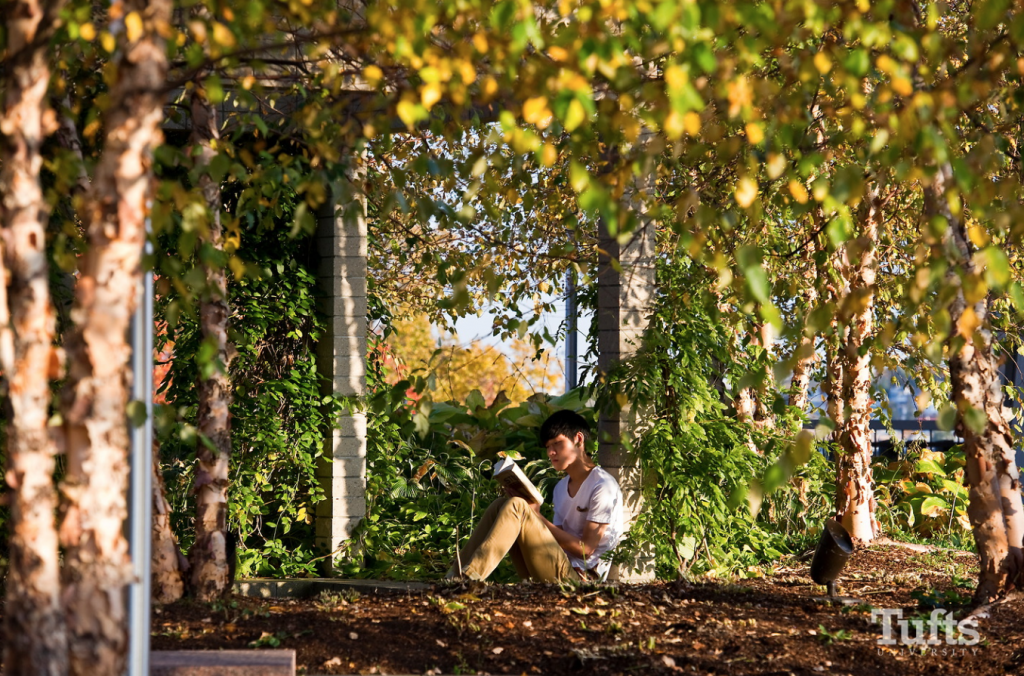
Written by Alia Wulff, Cognitive Psychology Ph.D. student
I have completed my fourth semester here at Tufts and have taken nine classes. Every single one of those classes had unique insights and learning experiences that make them impossible to compare. So I’m afraid the title of this blog post, “My Favorite Class at Tufts,” is basically just clickbait. I can’t pick a favorite class. It would be like making me choose a favorite between chocolate chip cookies, waterslides, and cute videos of unlikely animal friends. How could I choose between things that are so different and all so amazing?
However, that doesn’t mean I don’t have anything to write about. I may not have a specific class, but there certain factors that I look for when planning my class schedule. The first of these factors that affects my enjoyment of a class is my comfort with class discussion. This is really important in graduate school specifically, as most (if not all) classes are seminars. Even for the classes that aren’t seminars, it is important that the students are able to comfortably ask questions and interact with others in front of the class. My public speaking anxiety has gone down since entering graduate school, but it is still nerve-wracking to voice an opinion in front of a group of people. Anything that lessens that anxiety helps me to find my voice and engage directly with others’ ideas and opinions.
Secondly, I find direct application to be really important. Whether it is to my research, my teaching ability, or even my life, being able to apply the information I learn to my own experiences is really important. Being able to get something out of the class beyond a grade is an essential part of keeping the class relevant.
Finally, it is really important that I’m interested in spending 13+ weeks discussing the topic. This seems like a no-brainer, but it actually is more important than I expected. My undergraduate colleges were on a quarter system, so our classes took a max of 10 weeks. Going back to a semester system like I had in high school, feels like a big jump. Making sure the classes can engage my interest for such a long period of time is an important factor when I make my schedule. If there is a subject you want to learn about but don’t want to spend a whole semester studying, check if you can sit in on a few of the more pertinent classes or find a related workshop or talk you could attend.
I have a pretty good system to assess these factors ahead of time when registering for classes. It’s very easy if the class is in my department. I generally know the professor and their teaching style. I know the people taking the class or can ask around until I find them. I might even know people who have taken the class in the past and can give me information from a student’s perspective if needed. This is probably the main reason why I haven’t taken any classes I haven’t enjoyed at Tufts: I spend time making sure the class is pertinent and interesting before registering.
It does get trickier when the class is in a separate department. I have only taken one outside of my department. The course was designed to be cross-discipline and therefore other members of my lab had taken it, so I didn’t have to do too much investigating. If your program involves a lot more interdisciplinary classes you may have to do more research to ensure the class is a good fit, but it will be worth it. One of the perks of graduate school is you don’t have to go through two years of “trying classes out” before finding an area you actually enjoy.
You may have heard that classes don’t matter in graduate school. This is not true at all, at least in my case. While research is important and takes more time, every class I have taken so far has directly led to me being a better graduate student and researcher. Taking care with my class schedule and making sure I will benefit from every class I take is essential to my learning. Take classes seriously and you will receive serious benefits, I promise!











